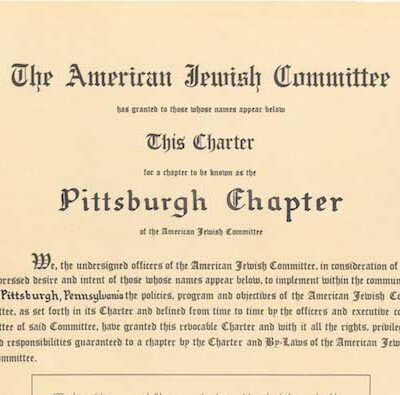
The American Jewish Committee was founded in 1906 to advocate for Jews all over the world. It expanded its mission in the mid-1940s to foster better relationships between communities and to advocate broadly for human rights. The Pittsburgh Chapter of the American Jewish Committee was chartered in October 1943, as part of a group of local chapters of the national organization. The initial officers of the chapter were A. Leo Weil Jr., Leon Falk, Louis Caplan, Robert J. Frank, Edgar J. Kaufmann, Stanley J. Kann, Frank R. S. Kaplan, Samuel M. Levinson, Sidney Stark, and Eugene Strassburger.
The American Jewish Committee-Pittsburgh Chapter developed curricula, hosted public events, sponsored research initiatives, and fostered relationships between the Jewish community and others in the area. Its projects included the Executive Suite program to integrate private social clubs in the city, the Catholic-Jewish Educational Enrichment Project (C-JEEP), Christian-Jewish Dialogues, and Hands Across the Campus. The organization gave the annual Louis Caplan Human Relations Award (later the Caplan-Leiber Award) to an area high-school student committed to improving interfaith relations.
The American Jewish Committee began closing some local branches in the early 21st century. In response, the Pittsburgh chapter was reorganized in 2008 as an independent affiliate called the Pittsburgh Area Jewish Committee. It closed in 2016, citing duplication of services within the community, challenges recruiting younger members, and declining support. Several of its programs continued under new organizations.[1]“PAJC closes, leaves behind storied legacy,” Pittsburgh Jewish Chronicle, July 13, 2016 (online—Pittsburgh Jewish Chronicle).